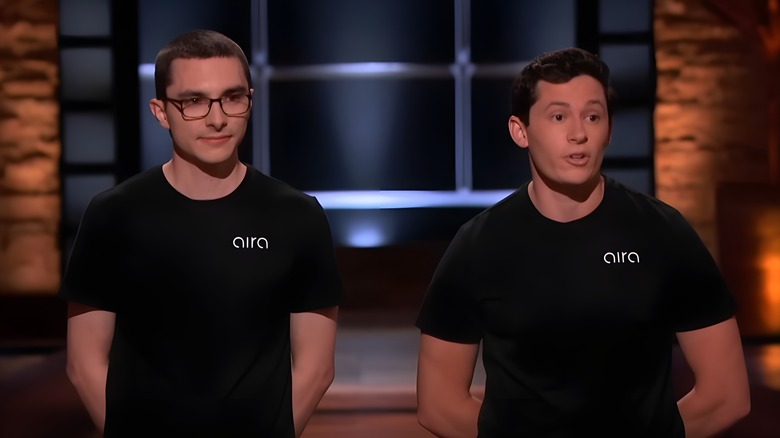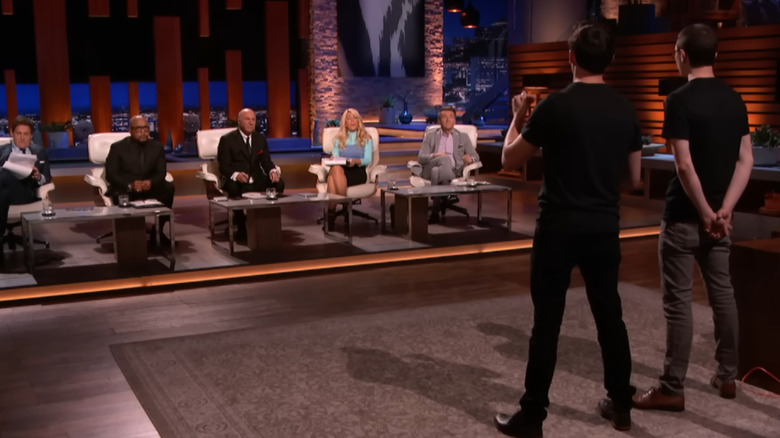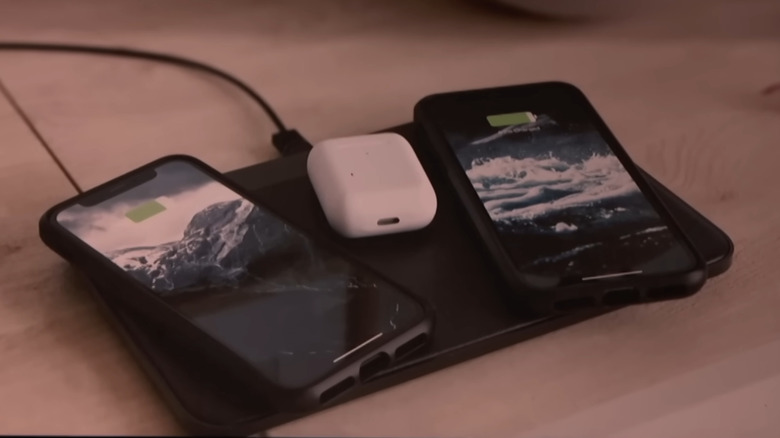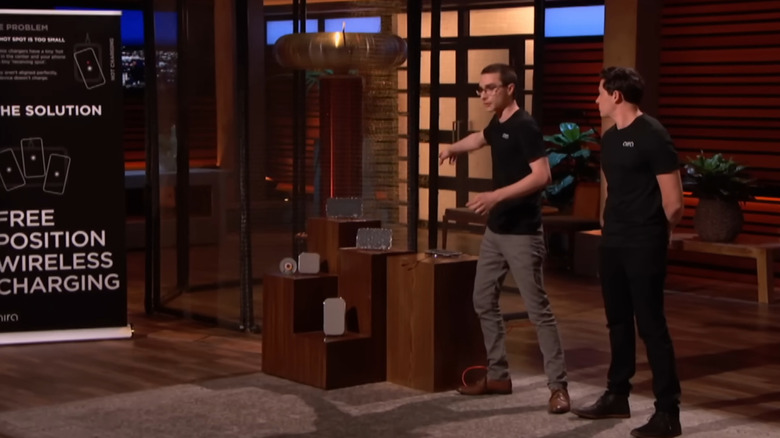Whatever Happened To Aira After Shark Tank?
"Shark Tank" has seen more than its fair share of businesses proclaiming to be the next big thing in the tech world, but not all are created equal. So could Aira be one of the show's true contenders? The company creates specially built wireless phone chargers. Unlike similar devices that require specific placement of the phone in order to work, Aira's pad-like design allows devices to power up more efficiently from being placed anywhere on the charger. On top of this, the added surface area means that users can charge multiple devices at once.
The business was started up by Arizona State grads Jake Slatnick and Eric Goodchild. Slatnick is primarily experienced in building mobile apps and apparel brands while Goodchild comes from the tech world, having extensive experience as an engineer and even building his own company Goodchild Engineering in 2009. Goodchild even acquired a Guinness World Record for most powerful bi-polar Tesla coil in 2014. The two combined their talents in 2017 to birth Aira. When they appeared on "Shark Tank," the business was still in the early phases, but the co-founders' versatile backgrounds and promising opportunities stood a chance of winning over the wealthy investors.
What happened to Aira on Shark Tank?
Aira's Jake Slatnick and Eric Goodchild make their way into the tank to pitch Aira for a $500,000 investment in return for a 7% equity stake. Asking for so much and still being in the pre-revenue stage is normally not the best setup for a deal on the show, but "Shark Tank" is no stranger when it comes to surprises.
While passing out their prototype model, the team shares that they plan to primarily focus on licensing their product, meaning that other tech businesses could purchase the Aira to fit their own brand. They currently have a licensing deal with a top company that has ordered 33,000 units and has already paid the $4 to $10 royalty fee for each unit. However, the business is burning through $30,000 each month, which they need to bring up to $50,000 with the help of a shark to amp up production.
Having already invested in a competitor, Mark Cuban goes out. Daymond John also exits, citing the constantly changing landscape of the tech industry as a concern. These worries do little to deter the other sharks. Robert Herjavec offers the $500,000 for 10%. He is followed by Kevin O'Leary and Lori Greiner, who propose to go in together for 15% equity, along with a 9% interest as a loan. Both the entrepreneurs and Herjavec agree that the company doesn't need the debt, resulting in O'Leary and Grenier dropping the loan and only wanting equity. Slatnick and Goodchild ask if all three sharks would go in for 15%, and the deal is made.
Aira after Shark Tank
Aira's "Shark Tank" episode aired on October 13, 2019, as part of Season 11 of the hit ABC reality series. On the night of the segment's airing, the sharks did not hesitate to share their admiration for what the company had accomplished, with investor Kevin O'Leary tweeting, "It takes a lot to blow me away but #AIRA is the real deal...these guys are doing what Apple couldn't!" Even Daymond John, who didn't invest in Aira, admitted to liking its strategy. "I like where they're going with this. Licensing allows you to get your product out there without having to spend on production, advertisement, or marketing," he wrote. "With innovative technology like this, it can be the perfect play." It didn't take long for their plan to take effect.
In January 2020, the team unveiled their official product, FreePower, at the Consumer Electronics Show (CES) in Las Vegas where it received a largely positive reception. Their partner, Nomad, officially integrated FreePower's technology into their new product, the Base Station Pro, which went on pre-order in August of the same year. Investors O'Leary, Lori Greiner, and Robert Herjavec released a video excitedly promoting the new development. Aira later fully rebranded itself as FreePower as a way of simplifying its identity as a company.
The team's next mission was to bring their innovative charging technology to the automotive industry. In 2021, FreePower secured $12 million in a new round of funding from investors such as Market Track CFO Jawad Ashan and auto parts supplier Motherson. Ashwan later became president of FreePower in 2022, with co-founder Eric Goodchild stepping down as CTO and board member in the same year.
Is Aira still in business?
FreePower remains committed to staying on the cutting edge of the industry. Today, the company offers both automotive and countertop options for wireless charging, with its website stating that its chargers make great fits for locations ranging from cars and nightstands to hotels, restaurants, and airports. Users of their tech can power multiple devices at once and it appears they have even developed products big enough for laptops and tablets.
Since FreePower is a licensing business, you won't find products for sale on its website. The aforementioned Base Station Pro by Nomad was the first to license the technology, followed soon by Volonic's Valet 3 in 2021. But more recently, FreePower added another key partnership to its roster. In December 2022, FreePower announced its collaboration with Tesla for a new line of wireless chargers, simply called the Wireless Charging Platform. Naturally, the association received some widespread attention, with various outlets such as Inverse, Yahoo, The Verge, and Jerry Rig Everything praising the new device as a game-changer, even if some did criticize its lofty $300 price point.
With so many innovations, FreePower and its founders are no strangers to prestigious accolades. Founder and CEO Jake Slatnick has been honored twice by Forbes, receiving spots on the platform's The Next 1000 and 30 under 30 lists. Additionally, the technology won CES Innovation Awards in 2021 and 2022, while also being placed on Fast Company's Top 10 most innovative consumer electronics companies. FreePower currently brings in $4 million a year in sales while having a net worth of $5 million.
What's next for Aira?
The sharks made what appears to be a worthwhile bet on FreePower. In only a handful of years following their time on "Shark Tank," Jake Slatnick and company have taken some massive steps forward. By thinking outside the box and adapting its tools to different scenarios and environments, FreePower has ensured its place in the ever-changing tech industry, even betting Apple at its own game, with the tech company having canceled its own wireless charging solution. And even then, it's clear that the team is only getting started.
FreePower's $12 million investment in 2021 was intended to go towards its efforts in breaking into the automotive space. However, even with major vehicle manufacturer Motherson as a backer, there have yet to be any significant developments in this arena. Tesla currently only seems to be using the technology for at-home charging options, but the partnership seems ripe with the potential to eventually integrate FreePower into Tesla's car manufacturing faction. Likewise, it would be interesting to see FreePower charging stations available in public spaces such as restaurants and hotels in the same way that conventional charging ports are, as the company has advertised on its website. The possibilities are truly endless with what FreePower can accomplish in its mission to make wireless charging a commonplace custom.




